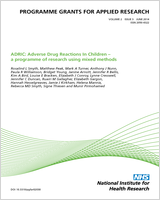Included under terms of UK Non-commercial Government License.
NCBI Bookshelf. A service of the National Library of Medicine, National Institutes of Health.
Tylee A, Barley EA, Walters P, et al.; on behalf of the UPBEAT-UK team. UPBEAT-UK: a programme of research into the relationship between coronary heart disease and depression in primary care patients. Southampton (UK): NIHR Journals Library; 2016 May. (Programme Grants for Applied Research, No. 4.8.)

UPBEAT-UK: a programme of research into the relationship between coronary heart disease and depression in primary care patients.
Show detailsContext
Can you tell me a little about the practice and the population you serve?
Probes: SES [socioeconomic status], ethnicity, challenges, special interests, additional services, special interest in mental health, practice population size.
Coronary heart disease
How much of a problem is CHD in this practice?
Probes: high-risk groups; age; ethnicity; gender.
How do you manage your CHD patients?
Probes: recording, role of other professionals, frequency of visits, are there particulate difficulties in managing these patients?
Coronary heart disease and depression
Defining depression in coronary heart disease
It appears from research that many people with CHD may also be depressed. What is your experience of this?
Probes: direction of causality; which factors are important: symptoms, family, SES, gender, exercise; factors specific to CHD compared with other illnesses; do you routinely consider depression in these patients? Is it a special problem?
What are your views on the inclusion in the Quality and Outcomes Framework (QOF) of depression screening in patients with CHD?
Probes: is it a good/bad idea, workable in practice/difficult to do, relevant/irrelevant.
How would you make a distinction between distress and depression in someone with CHD?
Probes: for instance, distress that is perhaps a normal reaction to an adverse life event, and depressive illness that may require management? Criteria used; causes; patient factors; severity; course; outcome.
Do the patients share your views?
Current management of depression in coronary heart disease
Are you currently treating any of your patients for CHD and depression?
Probes: severity of CHD; severity of depression; risk factors; did the patient seek help for their depression? What was it about this patient that made you decide to treat them?
How do you feel about treating patients with CHD and depression?
Probe: is it any different from managing depression in other patients?
How do you/would you manage depression in someone with CHD?
Probes: available resources – medication, talking therapy, IAPT, lifestyle changes, complementary therapies, voluntary agencies, cardiac rehabilitation services; role of other professionals; successes; barriers; are there any issues specific to people with CHD compared with other illnesses? Is CHD treatment or depression treatment altered by comorbidity?
What would you hope to happen as a result of treating someone with CHD for depression?
Probes: improvement in mood; improvement in physical health; adherence to treatment; priorities.
What about discussing depression and treatment for depression with your CHD patients? Are there particular issues?
Probes: barriers; patient concerns; patient factors – ethnicity, gender, SES, age.
Future treatment of depression in coronary heart disease
We are aiming to design a programme of care for people with both CHD and depression. What options would you like to see included?
Probes: which would be most important? Who would deliver; role of other professionals/agencies; who would you refer; are any of these options especially suited to particular groups of patients? CHD specific versus generic.
Can you foresee any difficulties with any of the potential options?
How many of your current patients would benefit?
How do you think your CHD patients would feel about these options?
Any other issues
Finally, are there any other issues that we haven’t addressed and that you would like to mention?
- Topic guide for general practitioners and practice nurses - UPBEAT-UK: a program...Topic guide for general practitioners and practice nurses - UPBEAT-UK: a programme of research into the relationship between coronary heart disease and depression in primary care patients
Your browsing activity is empty.
Activity recording is turned off.
See more...